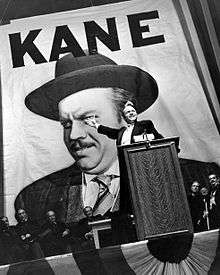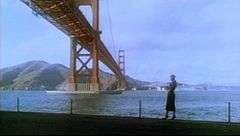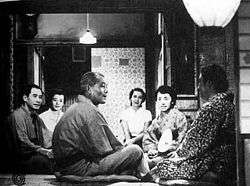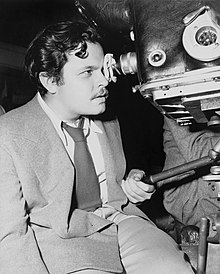Sight & Sound
Sight & Sound is a British monthly film magazine published by the British Film Institute (BFI).
| Editor | Mike Williams |
|---|---|
| Categories | Film |
| Frequency | Monthly |
| Publisher | British Film Institute |
| Year founded | 1932 |
| Country | United Kingdom |
| Language | English |
| Website | www |
| ISSN | 0037-4806 |
History and content
Sight & Sound was first published in 1932 and in 1934 management of the magazine was handed to the nascent BFI, which still publishes the magazine today.[1] Sight & Sound was published quarterly for most of its history until the early 1990s, apart from a brief run as a monthly publication in the early 1950s, but in 1991 it merged with another BFI publication, the Monthly Film Bulletin, and started to appear monthly. The journal was edited by Gavin Lambert from 1949 to 1955, and from 1956 to 1990 by Penelope Houston.[2] The relaunch editor was Philip Dodd. It is currently edited by Mike Williams. The magazine reviews all film releases each month, including those with a limited (art house) release, as opposed to most film magazines which concentrate on those films with a general release. Sight & Sound features a full cast and crew credit list for each reviewed film, as well as the entire plot of said film.
The Sight & Sound Poll of the Greatest Films of All Time
Every decade, Sight & Sound asks an international group of film professionals to vote for their ten greatest films of all time. Until 1992, the votes of the invited critics and directors were compiled to make one list. However, since 1992, directors have been invited to participate in a separate poll.
The individual results are eclectic; in the 2002 poll, 2,045 different films received at least one mention from one of the 846 critics. Even the top-of-the-list consensus has its limits.
The Sight & Sound accolade has come to be regarded as one of the most important of the "greatest ever film" polls. Roger Ebert described it as "by far the most respected of the countless polls of great movies—the only one most serious movie people take seriously."[3] The first poll, in 1952, was topped by Bicycle Thieves. The five subsequent polls (1962–2002) were won by Citizen Kane (which finished 13th in 1952), while Vertigo received the most votes in 2012.[4] Only La Règle du jeu (The Rules of the Game) has appeared in all seven of the magazine's decennial polls. Among the directors that participated in 2012 are Quentin Tarantino, Martin Scorsese, Ken Loach and Francis Ford Coppola.
Sight & Sound has in the past been the subject of criticism, notably from Raymond Durgnat, who often accused it of elitism, puritanism and snobbery, although he did write for it in the 1950s, and again in the 1990s.[5][6] The magazine's American counterpart is Film Comment, a magazine published by the Film Society of Lincoln Center in New York City.[7]
Critics' Top Ten Poll
1952
- Bicycle Thieves (25 mentions)
- City Lights (19 mentions)
- The Gold Rush (19 mentions)
- Battleship Potemkin (16 mentions)
- Intolerance (12 mentions)
- Louisiana Story (12 mentions)
- Greed (11 mentions)
- Le Jour Se Lève (11 mentions)
- The Passion of Joan of Arc (11 mentions)
- Brief Encounter (10 mentions)
- The Rules of the Game (10 mentions)
- Le Million (10 mentions)
Closest runners-up: Citizen Kane, La Grande Illusion, and The Grapes of Wrath. (9 mentions apiece)
1962

- Citizen Kane (22 mentions)
- L'Avventura (20 mentions)
- The Rules of the Game (19 mentions)
- Greed (17 mentions)
- Ugetsu (17 mentions)
- Battleship Potemkin (16 mentions)
- Bicycle Thieves (16 mentions)
- Ivan the Terrible (16 mentions)
- La Terra Trema (14 mentions)
- L'Atalante (13 mentions)
Closest runners-up: Hiroshima mon amour, Pather Panchali and Zero for Conduct. (11 mentions apiece)
1972
- Citizen Kane (32 mentions)
- The Rules of the Game (28 mentions)
- Battleship Potemkin (16 mentions)
- 8½ (15 mentions)
- L'Avventura (12 mentions)
- Persona (12 mentions)
- The Passion of Joan of Arc (11 mentions)
- The General (10 mentions)
- The Magnificent Ambersons (10 mentions)
- Ugetsu (9 mentions)
- Wild Strawberries (9 mentions)
Closest runners-up: The Gold Rush, Hiroshima mon amour, Ikiru, Ivan the Terrible, Pierrot le Fou, and Vertigo. (8 mentions apiece)
1982
- Citizen Kane (45 mentions)
- The Rules of the Game (31 mentions)
- Seven Samurai (15 mentions)
- Singin' in the Rain (15 mentions)
- 8½ (14 mentions)
- Battleship Potemkin (13 mentions)
- L'Avventura (12 mentions)
- The Magnificent Ambersons (12 mentions)
- Vertigo (12 mentions)
- The General (11 mentions)
- The Searchers (11 mentions)
Closest runners-up: 2001: A Space Odyssey and Andrei Rublev. (10 mentions apiece)
1992
- Citizen Kane (43 mentions)
- The Rules of the Game (32 mentions)
- Tokyo Story (22 mentions)
- Vertigo (18 mentions)
- The Searchers (17 mentions)
- L'Atalante (15 mentions)
- The Passion of Joan of Arc (15 mentions)
- Pather Panchali (15 mentions)
- Battleship Potemkin (15 mentions)
- 2001: A Space Odyssey (14 mentions) [9]
Closest runners-up: Bicycle Thieves and Singin' in the Rain. (10 mentions apiece)
2002
- Citizen Kane (46 mentions)
- Vertigo (41 mentions)
- The Rules of the Game (30 mentions)
- The Godfather and The Godfather Part II (23 mentions)
- Tokyo Story (22 mentions)
- 2001: A Space Odyssey (21 mentions)
- Battleship Potemkin (19 mentions)
- Sunrise: A Song of Two Humans (19 mentions)
- 8½ (18 mentions)
- Singin' in the Rain (17 mentions)
Closest runners-up: Seven Samurai and The Searchers. (15 mentions apiece)
2012

A new rule was imposed for this ballot: related films that are considered part of a larger whole (e.g. The Godfather and The Godfather Part II, Krzysztof Kieślowski's Three Colors trilogy and Dekalog, or Satyajit Ray's The Apu Trilogy) were to be treated as separate films for voting purposes.[10]
For the 2012 poll, Sight & Sound also listened to decades of criticism about the lack of diversity of its poll participants and made a huge effort to invite a much wider variety of critics and filmmakers from around the world to participate, taking into account gender, ethnicity, race, geographical region, socioeconomic status, and other kinds of underrepresentation.[10]
- Vertigo (191 mentions)
- Citizen Kane (157 mentions)
- Tokyo Story (107 mentions)
- The Rules of the Game (100 mentions)
- Sunrise: A Song of Two Humans (93 mentions)
- 2001: A Space Odyssey (90 mentions)
- The Searchers (78 mentions)
- Man with a Movie Camera (68 mentions)
- The Passion of Joan of Arc (65 mentions)
- 8½ (64 mentions)
Closest runner-up: Battleship Potemkin. (63 mentions)
Directors' Top Ten Poll
1992
2002
- Citizen Kane (42 mentions)
- The Godfather and The Godfather Part II (28 mentions)
- 8½ (19 mentions)
- Lawrence of Arabia (16 mentions)
- Dr. Strangelove (14 mentions)
- Bicycle Thieves (13 mentions)
- Raging Bull (13 mentions)
- Vertigo (13 mentions)
- Rashomon (12 mentions)
- The Rules of the Game (12 mentions)
- Seven Samurai (12 mentions)
2012

- Tokyo Story (48 mentions)
- 2001: A Space Odyssey (42 mentions)
- Citizen Kane (42 mentions)
- 8½ (40 mentions)
- Taxi Driver (34 mentions)
- Apocalypse Now (33 mentions)
- The Godfather (31 mentions)
- Vertigo (31 mentions)
- Mirror (30 mentions)
- Bicycle Thieves (29 mentions)
The Greatest Directors of All Time

This list was put together by assembling the directors of the individual films that the critics and the directors polled voted for. 2002 was the only year Sight & Sound compiled the list.
Critics' Top Ten Poll
2002
Directors' Top Ten Poll
Greatest Documentaries of All Time
2014
- Man with a Movie Camera (100 votes)
- Shoah (68 votes)
- Sans Soleil (62 votes)
- Night and Fog (56 votes)
- The Thin Blue Line (49 votes)
- Chronique d'un été (32 votes)
- Nanook of the North (31 votes)
- The Gleaners and I (27 votes)
- Dont Look Back (25 votes)
- Grey Gardens (25 mentions)
See also
- Cahiers du Cinéma's Annual Top Ten Films
- Empire magazine
- List of film periodicals
References
- A Guide to Sight & Sound's Film Polls - Davide Mastracci - Medium
- "Penelope Houston: Influential editor of 'Sight & Sound' magazine". The Independent. 30 October 2015. Retrieved 24 August 2017.
- Roger Ebert. "'Citizen Kane' fave film of movie elite". Chicago Sun-Times. Retrieved 1 January 2008.
- Johnson, Eric C. Sight and Sound Poll 1952: Critics, Caltech.
- Miller, Henry K. "Poetry in motion". BFI Film Forever. BFI. Retrieved 14 November 2014.
- Gough-Yates, Kevin. "Raymond Who?". Raymond Durgnat.com. The Estate of Raymond Durgnat. Retrieved 14 November 2014.
- Academic Journals
- The Greatest Films of All Time… in 1952 [Sight & Sound]
- Film 92 - Sight and Sound survey-Internet Archive
- "How we made the Greatest Films of All Time poll". Sight & Sound. BFI.
- "The 100 Greatest Films of All Time". Sight & Sound. British Film Institute. Retrieved 23 March 2020.
- "Directors' Top 100". Sight & Sound. British Film Institute. 2012.
- The Best Documentaries of All Time-Sight & Sound-BFI
Further reading
- Pam Cook and Philip Dodd (eds): Women and Film. A Sight and Sound Reader, London: Scarlet Press, 1994, 287 p.
- Jacqueline Louviot: Le regard de Sight and Sound sur le cinéma britannique des années 50 et 60 (What Sight and Sound Saw: Sight and Sound on British Cinema during the Fifties and Sixties), French doctoral thesis, University of Strasbourg II, 1997, 980 p.
- David Wilson (ed): Sight and Sound. A Fiftieth Anniversary Selection, London: Faber and Faber in association with BFI Publishing, 1982, 327 p.
External links
- Sight & Sound official website
- Ahead of our Greatest Film of All Time poll, Michael Atkinson anatomises critics’ obsession with enshrining cinema’s ‘top ten’.
- September 2012 Issue of S&S featuring "The Greatest Films of All Time"
- Archived Sight & Sound magazines on the Internet Archive